Internet has become an integral part of our daily lives. It has changed the way we interact with people, the way we work or study, and it has definitely changed the way we shop. There was a time when shopping in stores was the preferred way to shop, but since the past decade, there has been a continuous boom in online shopping. E-commerce is one of the fastest-growing sectors in the world. A 2019 report states that 46% of consumers prefer to shop online. With that stat, it's safe to say that e-commerce has taken the shopping world by storm by bringing the shopping experience to the consumers' fingertips without having the need to go out.
What is E-commerce?
E-commerce or electronic commerce is a business process that refers to buying and selling of goods or services facilitated through the internet.
There are many benefits of e-commerce. A few of them are mentioned below –
24/7 income potential: Since the store is online, it's always open for business, thus allowing you to attract customers who may have odd working schedules or no time for retail shopping.
Encourage impulse buying: It is easier to capitalize on impulse buying habits of a shopper as online customers are more likely to partake in it.
Customer data: E-commerce website requires customers to signup, thus giving out their name, e-mail address, and phone number. This provides companies with different ways to communicate with them and build a relationship.
Attract new & old customers: By creating attractive PPC ads and remarketing ads, e-commerce businesses can gain the attention of new and existing customers.
Different traffic streams: With the power of Search Engine Optimization (SEO) and Pay-Per-Click advertising (PPC ads), e-commerce businesses can expand their customer reach by developing an online presence, thus driving traffic from different channels.
Go global: Since e-commerce websites are not restricted by geographical boundaries, it provides the opportunity to expand the business across the globe and target customers without any location limit & restriction.
 Best PPC practices to put to work
Best PPC practices to put to work
PPC advertising is the most effective way of increasing the conversion rate of business, including e-commerce. To optimize your PPC ad strategies for e-commerce, you have to take certain factors into account. We're going to discuss the best PPC practices that you can put to use in your e-commerce PPC campaign.
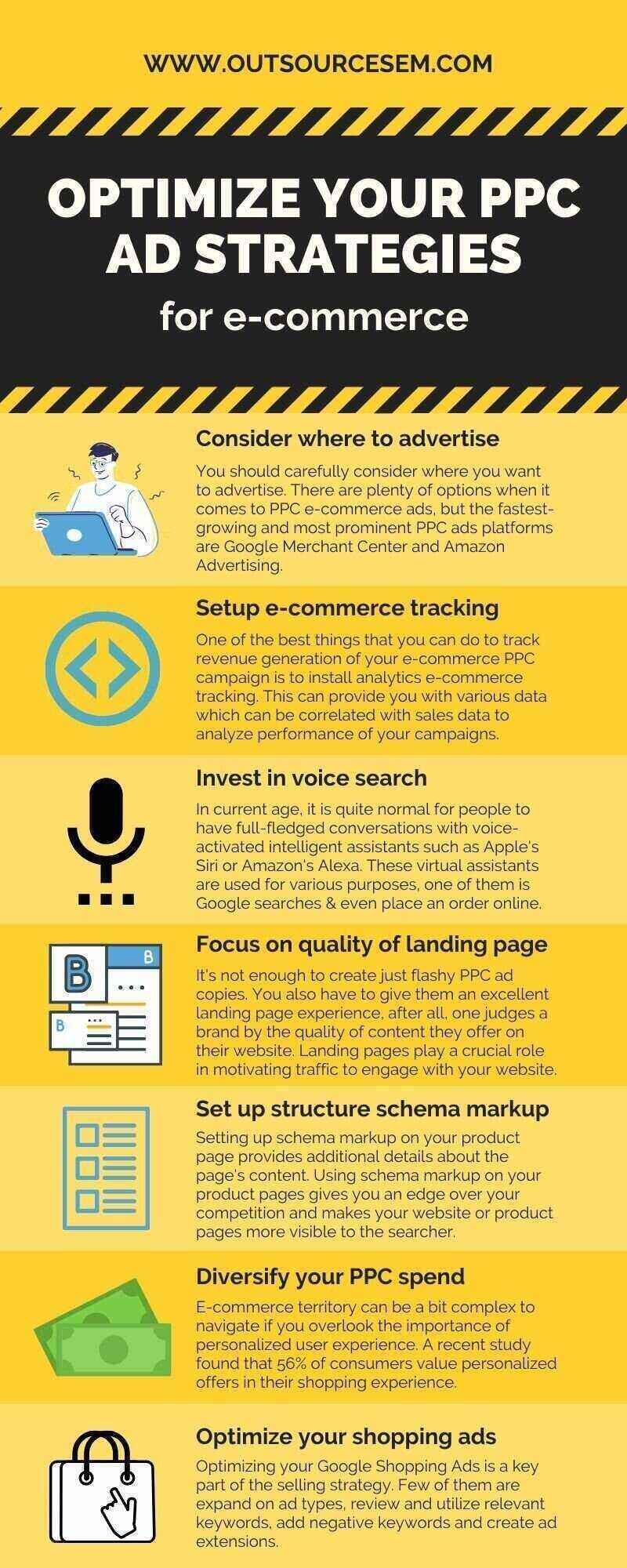
Consider where to advertise: When it comes to PPC e-commerce ads, you should carefully consider where you want to advertise. There are plenty of options when it comes to PPC e-commerce ads, but the fastest-growing and most prominent PPC ads platforms are Google Merchant Center and Amazon Advertising.
According to Google itself, "Google Merchant Center helps you get your shop and product info into Google and make it available to shoppers across Google. That means that everything about your shops and products is available to customers when they search on a Google property." In other words, its main aim is to provide businesses to upload and manage the information regarding their products so that these products are seen by users in Google Shopping search results. It's meant to power your Google Shopping ads and increase the visibility of your product.
According to Amazon, its "ad solutions to help you find, attract, and engage millions of Amazon customers at every stage of their journey." Amazon advertising offers various self-service solutions to get started on its platform such as sponsored products, sponsored brands, and more. Amazon has reported that it has almost 150 million Amazon Prime paying members worldwide and with so many users, they naturally have collected much data about their shopping and purchasing habits. So it would be great to advertise on this platform.
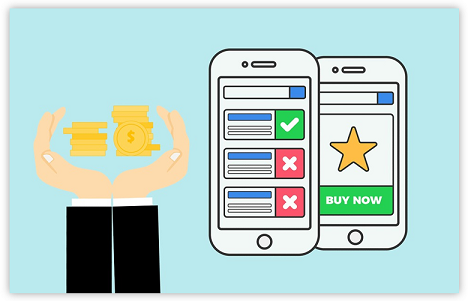
Setup e-commerce tracking: One of the best things that you can do to track the revenue generation of your e-commerce PPC campaign is to install analytics e-commerce tracking. Setting up Google Analytics Ecommerce Tracking on your website can provide you with various data like bounce rate, traffic source/medium, landing pages, etc. which can be correlated with sales data to analyze the performance of your marketing campaigns.
Analytics e-commerce tracking provides valuable insights into the particular items that are selling more, where those sales are coming from and the revenue you're generating from each sale. They also help you in understanding which landing pages and campaigns are driving more sales. This information is important and makes it easier to optimize and workout better PPC e-commerce campaigns.
![]()
Invest in voice search: In the current day and age, it is quite normal for people to have full-fledged conversations with voice-activated intelligent assistants such as Apple's Siri or Amazon's Alexa. These virtual assistants are used for various purposes and one of them is to perform Google searches and even place an order online. 20% of all mobile searches are voice searches, mainly because it is convenient, efficient, and hands-free.
Voice search is the future of e-commerce and it is growing faster than anything else. There is no doubt that voice search will change the way people make search queries by impersonating real-life conversations which will allow for more natural queries. Thus, incorporating natural language keywords or long-tail keywords in your e-commerce PPC ads is the first step in optimizing e-commerce for voice search. With voice search, the language will be more flexible, in other words, more "human" so adapting the tone and style of how people speak in general is the way forward. As voice search technology is becoming more accurate by the day to invest in voice search for promising results in the future.
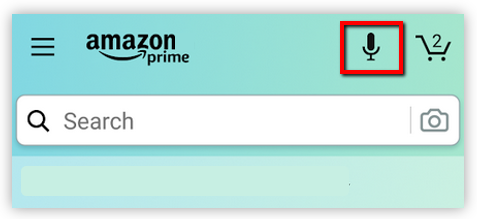
Focus on quality of landing page: It's not enough to create just flashy PPC ad copies. You also have to give them an excellent landing page experience, after all, one judges a brand by the quality of content they offer on their website. Your e-commerce PPC ads bring the traffic to landing pages which is why landing pages play a crucial role in motivating the traffic to engage with your website.
Since it's impractical to create a unique website for each and every user, you can create unique digital storefronts. A landing page is a medium through which e-commerce brands adapt to the user in question, thus creating an impressive and relevant experience for individuals engaging on the website. Thus, taking the customer-first approach and creating impactful landing pages will guide the traffic in whichever direction you want it to go.

Set up structure schema markup: Setting up schema markup on your product page provides additional details about the page's content. So when a user searches for a product on Google, they will see what Google calls a rich card or rich snippets, which will show your product image and relevant information like color, size, etc. on the search page. Using schema markup on your product pages gives you an edge over your competition and makes your website or product pages more visible to the searcher.
You can check if your e-commerce website or product page has the proper schema markup by using the structured data testing tool. Just enter the URL of your product page, run the test and it will tell you if whether or not you have proper schema markup. It will also show you warnings (if needed) and give some tips to improve upon.
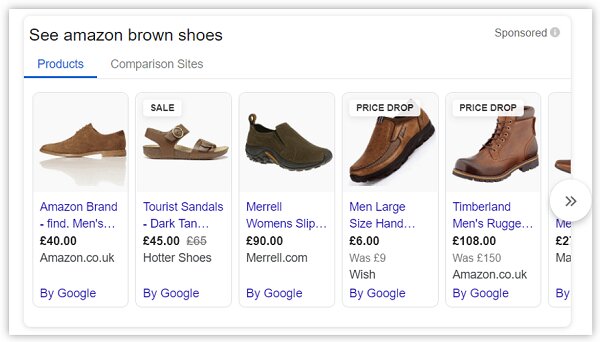
Diversify your PPC spend: E-commerce territory can be a bit complex to navigate if you overlook the importance of personalized user experience. A recent study found that 56% of consumers value personalized offers in their shopping experience. Thus, it's safe to assume that consumers feel more valued and comfortable when they're dealing with a business that focuses on their personalized needs and offers them accordingly rather than a cookie-cutter way of communication.
Building brand loyalty and forging strong customer relations is both a challenge and an opportunity got e-commerce business owners. The possible way to start e-commerce PPC marketing is Google Ads. Not only is the Google Ads platform flexible and responsive, but it allows you to showcase your range of products in an easy to navigate format. You can provide a personalized experience to your shoppers through email marketing. Email marketing gives room for experiments that enables you to tailor the content to the interest of the shopper.
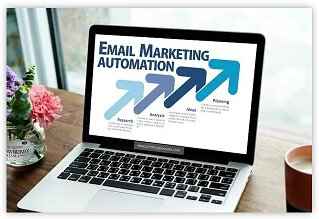
Optimize your shopping ads: Optimizing your Google Shopping Ads is a key part of the selling strategy. Below mentioned are a few points to help you with the same –
i. Expand on ad types - Shopping ads and text ads both are useful to sell products. While text ads allow you to highlight specific features of the product, shopping ads are incredibly effective in reaching shoppers with precise search queries by providing clickable images. Making use of both these types of campaigns can give you the best results.
ii. Review and utilize relevant keywords - Finding relevant search queries that have generated most sales from your business is one of the best optimization practices. You can merge these queries with your best-performing keywords for maximum profit.
iii. Add negative keywords - This is another great practice, as bidding higher on your shopping ads exposes your products to more types of searches rather than improving their rankings. Thus, setting up a negative keywords list prevents unwanted search traffic.
iv. Create ad extensions - Google Ads offer many ad extensions that your e-commerce PPC campaign can benefit from. For example, sitelink extensions, review extensions, structured snippets, etc.
Wrap Up
As the e-commerce business continues to expand globally, business owners and advertisers will have to find new ways to market their products and services online. As mentioned above, more and more people are turning to e-commerce for their shopping needs. PPC advertising is best for e-commerce businesses as they are flexible and you can get very granular in your ads. E-commerce PPC advertising is as specific as it gets, thus it only makes sense to optimize it and build a coherent and multi-faceted online presence. If the process seems too daunting, you can always outsource e-commerce services to a certified digital marketing agency that provides ppc advertising services. Put the above strategies into practice and eventually, you'll be rewarded with handsome revenues. With our digital marketing company you can outsource remarketing services, lead generation, conduct PPC audit, carry out PPC report, run search ads, video ads, display ads, mobile ads for your campaign. Also by the help of digital marketing experts you can carry out PPC campaign analysis.
References:
• 11 Proven PPC strategies for your ecommerce site
• 20 Ecommerce Advantages and Disadvantages You Need to Know
